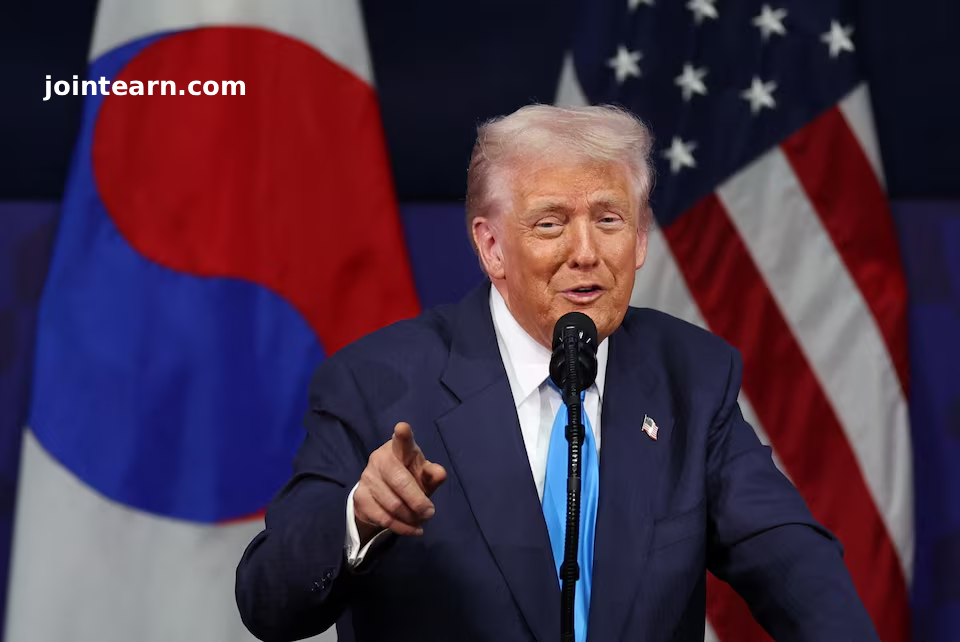
SEOUL – U.S. President Donald Trump once again took aim at Federal Reserve Chair Jerome Powell, criticizing what he called the Fed’s reluctance to cut interest rates quickly enough to support economic growth. Speaking at the Asia-Pacific Economic Cooperation (APEC) CEO Summit in Gyeongju, South Korea, Trump accused Powell of acting “too late” to address what he described as unnecessary monetary tightness.
“Jerome ‘Too Late’ Powell,” Trump said, sparking laughter among business leaders and government officials attending the high-profile conference.
The remark underscores Trump’s continued frustration with the Federal Reserve’s cautious stance on interest rate reductions, which he has repeatedly argued are slowing U.S. economic momentum.
Trump Pressures the Federal Reserve for Faster Rate Cuts
Trump said his administration is working to ensure the United States does not have a central bank “raising interest rates because they’re worried about inflation three years from now.” The comment appeared to acknowledge the risk of future inflation but emphasized short-term economic expansion over long-term price stability.
According to Trump, his administration expects the U.S. economy to grow by 4% in the first quarter of 2026, a projection far above most economists’ forecasts. Economists surveyed by Reuters have noted that the White House’s new import tariffs and trade restrictions could continue to weigh on U.S. growth, limiting the impact of potential monetary easing.
The Federal Reserve, led by Powell since 2018, has faced political pressure from the Trump administration to move more aggressively on rate cuts amid slowing manufacturing activity and weak business confidence. Market analysts anticipate that the Fed may cut its benchmark interest rate by 25 basis points during its upcoming meeting on October 28–29, 2025, though uncertainty remains about the pace of future reductions.
Trump’s Comments Highlight Growing Policy Tensions
Wednesday’s remarks highlight the persistent tension between the White House and the Federal Reserve, an independent institution that sets U.S. monetary policy. Trump’s public criticisms of Powell have become a hallmark of his presidency, especially as he seeks to sustain strong economic growth ahead of the 2026 midterm elections.
Analysts warn that such comments could undermine investor confidence in the Fed’s independence. “The President’s repeated remarks about Powell risk politicizing monetary policy at a time when market stability is crucial,” said a Seoul-based economist attending the APEC Summit.
Despite the friction, Trump praised recent investment commitments from several global corporations, saying they reflect confidence in U.S. economic strength.
Trump Highlights Foreign Investment Commitments
During his APEC speech, Trump listed a series of new investment pledges totaling hundreds of billions of dollars from major multinational companies, including Taiwan’s TSMC Global, Japan’s SoftBank, and South Korea’s Hyundai Motor Co. He also mentioned new commitments from leading pharmaceutical firms.
“These investments show that global businesses are betting on the American economy and our pro-growth policies,” Trump declared.
He added that his administration is seeking to strengthen collaboration with South Korea and Japan in industries such as shipbuilding, advanced manufacturing, and technology innovation — sectors that are expected to benefit from U.S. reindustrialization and supply chain diversification policies.
The Broader Economic Context
The President’s renewed push for lower interest rates comes as the U.S. faces a complex economic backdrop marked by moderate inflation, global trade disruptions, and uncertain consumer demand. Although inflation has eased from its 2022–2023 peaks, the Fed has maintained a cautious approach, signaling that it wants to see sustained progress toward its 2% inflation target before implementing deeper cuts.
Meanwhile, global central banks — including the European Central Bank (ECB) and the Bank of England (BoE) — have already initiated moderate rate cuts to support economic recovery, adding pressure on the Fed to follow suit.
Conclusion
As the Fed prepares for its late-October policy meeting, markets remain closely tuned to both Powell’s statements and Trump’s political rhetoric. Any sign of discord between the administration and the central bank could influence investor sentiment, the dollar’s trajectory, and global capital flows.
Trump’s comments in South Korea reaffirm that monetary policy — particularly interest rate decisions — will remain a central issue as the United States navigates the final stretch of 2025’s economic challenges and prepares for a crucial election year.


Leave a Reply